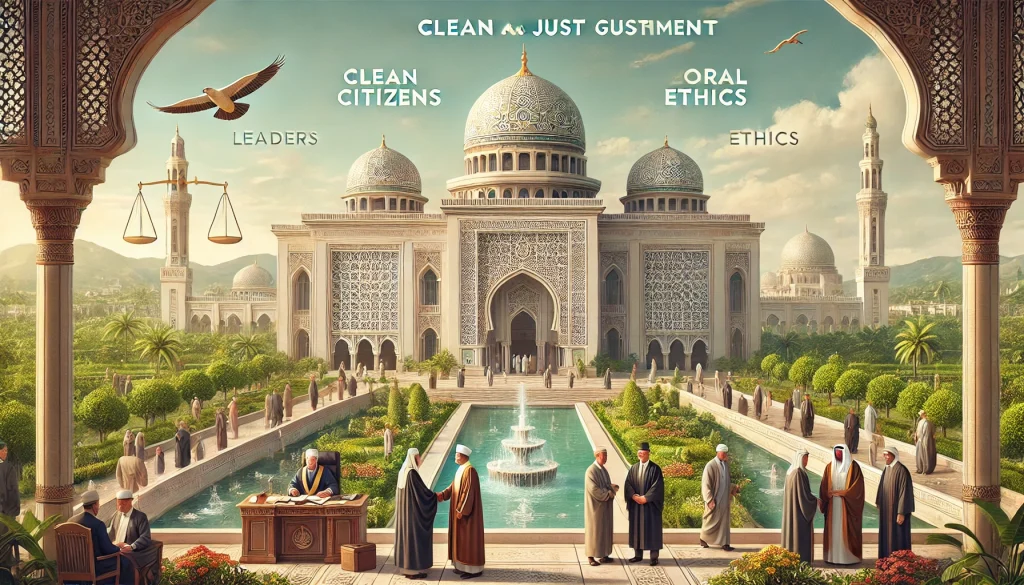Clean Governance in Islam

By Dr. Abdul Wadud Nafis, LC., MEI
In Islam, leadership is not merely a position but a great trust that must be carried out with full responsibility. History records how the Prophet Muhammad (PBUH) and the caliphs established a clean, just, and people-oriented government. The concept of clean governance in Islam is not only about transparency and accountability but also emphasizes the values of trust (amanah), justice, and consultation (shura) in decision-making. These principles remain relevant in the modern era as a guide in building a governance system with integrity.
Clean governance in Islam refers to state administration based on trust, justice, transparency, accountability, anti-corruption, and consultation. These principles are derived from the Qur’an, hadith, and the leadership practices of the caliphs. The following is a systematic explanation of the concept of clean governance in Islam:
1. Governance is a Trust (Amanah)
Governance in Islam is not a personal right but a trust that must be carried out with full responsibility.
Evidence:
“Indeed, Allah commands you to render trusts to whom they are due…” (QS. An-Nisa: 58).
Explanation:
A leader must exercise power with the awareness that leadership is a great responsibility that will be held accountable before Allah and the people.
2. Justice as the Main Pillar
A clean government must uphold justice without discrimination against anyone.
Evidence:
“O you who have believed, be persistently standing firm in justice, witnesses for Allah, even if it be against yourselves or parents and relatives…” (QS. An-Nisa: 135).
Explanation
A leader must be fair in policy-making without favoring any particular group. The Prophet Muhammad (PBUH) emphasized that previous nations perished because they only punished the weak while allowing the powerful to escape justice.
3. Transparency and Accountability (Hisbah)
Islamic governance emphasizes transparency in state administration and accountability to the people.
Evidence:
Caliph Umar bin Khattab (RA) said, “Hold yourselves accountable before you are held accountable.”
Explanation:
Leaders must be open in decision-making, and the people have the right to criticize and oversee the government’s performance.
4. Prohibition of Corruption, Nepotism, and Bribery
Islam strictly prohibits all forms of corruption and abuse of power.
Evidence:
The Prophet Muhammad (PBUH) said, “Allah curses those who give and receive bribes.” (HR. Abu Dawud).
Explanation:
Leaders and government officials must not abuse their power for personal or group interests. Caliph Umar bin Abdul Aziz refused to accept gifts as they were considered hidden bribes.
5. Consultation (Shura) as the Basis for Decision-Making
Government decisions in Islam must be made through consultation and public participation.
Evidence:
“And those who have responded to [their] tyrant with patience and forgiveness, and their affairs are [determined by] consultation among them…” (QS. Ash-Shura: 38).
Explanation:
A leader must listen to the aspirations of the people, as the Prophet Muhammad (PBUH) and the caliphs always engaged in consultation before making major decisions.
6. Leaders Must Be Role Models in Simplicity
Islamic leaders are expected to live simply and not indulge in luxury through power.
Evidence:
Caliph Umar bin Khattab (RA) was known for sleeping on the ground despite being the greatest leader of his time.
Explanation:
A clean leader must prioritize the welfare of the people over personal interests.
7. Strict Supervision of Government Officials
Islam teaches that every government official must be supervised and held accountable before the people.
Evidence:
Caliph Umar bin Khattab (RA) required officials to report their wealth before and after taking office.
Explanation:
This measure serves as a control mechanism against possible abuse of power and corruption.
Conclusion
Clean governance from an Islamic perspective must be based on trust, justice, transparency, accountability, anti-corruption, and consultation. Islamic history provides real examples of clean leadership, such as in the governance of Abu Bakr, Umar bin Khattab, and Umar bin Abdul Aziz. These principles remain highly relevant for modern governance to establish justice and integrity.
Clean governance in Islam is not just an ideal concept but a necessity demonstrated by the Prophet Muhammad (PBUH) and the caliphs. By implementing the principles of trust, justice, transparency, and consultation, a nation can achieve true stability and prosperity. In the modern era, these values remain relevant as a foundation for building governance that is both just and with integrity. Leadership, in essence, is a responsibility, not merely an exercise of power.
References
1. The Qur’an and Its Translation. Ministry of Religious Affairs, Republic of Indonesia.
2. Al-Mawardi. (2000). Al-Ahkam As-Sultaniyyah (The Laws of Islamic Governance). Translation. Jakarta: Darul Falah.
3. Ibn Khaldun. (2000). Muqaddimah. Translation. Jakarta: Pustaka Al-Kautsar.
4. Al-Ghazali. (1997). Ihya’ Ulumuddin. Translation. Jakarta: Pustaka Azzam.
5. Yusuf al-Qaradawi. (2001). The Islamic System of Governance. Jakarta: Gema Insani Press.
6. Abu Yusuf. (1979). Kitab al-Kharaj. Cairo: Dar al-Ma’arif.
7. Syafi’i Antonio, M. (2002). Muhammad SAW: The Super Leader Super Manager. Jakarta: Tazkia Publishing.
8. Nasution, Harun. (1985). Islam from Various Perspectives. Jakarta: UI Press
9. An-Nabhani, Taqiyuddin. (1994). Mafahim Siyasiyah Hizb al-Tahrir. Beirut: Dar al-Ummah.
10. Kamali, Mohammad Hashim. (2008). Principles of Islamic Jurisprudence. Cambridge: Islamic Texts Society.
